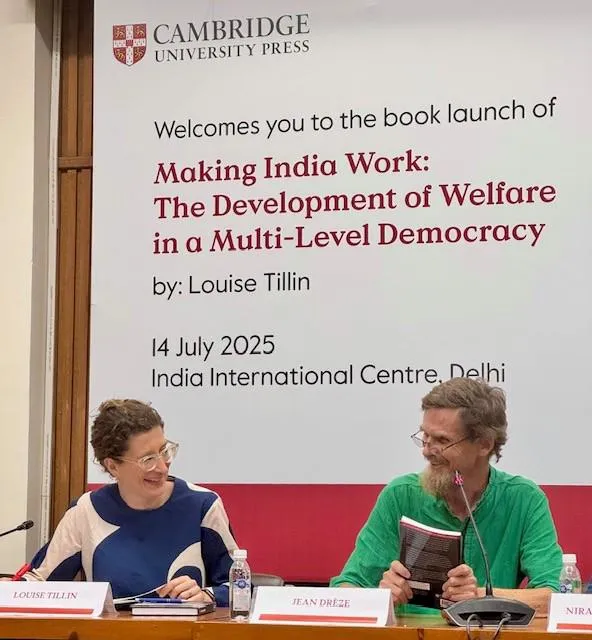22 July 2025
Rethinking Welfare in India's Political Economy
New book is more than a historical account—it’s a call to rethink how welfare is conceptualized and delivered in India

As welfare politics takes centre stage in India where employment growth and poverty reduction has not kept up with economic growth, a major new book by King’s political scientist Professor Louise Tillin is sparking timely debate across the country.
Making India Work: The Development of Welfare in a Multi-Level Democracy explores how India’s welfare regime emerged through a century of nation-building. It unearths a previously untold history of how India’s architecture of social security was built in the context of debates about how to make India work as a national economy and polity, through the regulation of inter-regional economic competition and responding to popular demands in a context of democratic consolidation.
The book also shows how the dilemma of how to generate employment – how to put Indians to work - has been central to the design of social policy.
The title was launched across three major cities—Delhi, Chennai, and Bangalore—with each event drawing scholars, journalists, and policy thinkers into a conversation about the past, present, and future of India’s welfare state.
Across all three events, a common theme emerged: the need to think about welfare in India as a necessary adjunct to India’s story of economic growth, moving beyond the highly politicised debate about today’s cash transfers as ‘freebies’ that endanger fiscal stability.
Making India Work offers the first historical account of the factors that have shaped India’s approach to welfare and social security over the last century. Across the three events, panellists reflected on:
- The historical role of business and labour in negotiating and fighting over welfare policies
- The future of welfare policies in a context of ‘jobless growth’ where tensions are growing about fiscal commitments to welfare provision over other development priorities
- Why India did not embark on a more universal approach to welfare in the mid-twentieth century creating the highly stratified approach that persists today
- Why approaches to welfare have focused as much on the ‘duty to work’ as rights of citizenship
Professor Tillin says her work shows that India has developed a surprisingly wide-reaching welfare system for its income level, but one that is deeply uneven in reach and quality.
At the Delhi launch, hosted at the India International Centre, Professor Tillin was joined by economist and social activist Jean Drèze, Hindustan Times journalist Roshan Kishore, former Director of the Centre for Policy Research and senior visiting fellow at Brown University, Yamini Aiyar in a panel chaired by Professor Niraja Gopal Jayal of King’s India Institute.

Panellists expressed their surprise at some of the history uncovered by the book. Yamini Aiyar said “I didn’t know there was a moment when the possibility of an Indian Beveridge Report was actually imagined on the eve of Independence. That may well have been a game-changer.’
In a piece for his Terms of Trade column in the Hindustan Times, Roshan Kishore wrote:
‘Everybody, from fund managers in Wall Street to RWA [Resident’s Welfare Association] WhatsApp groups, has an opinion on welfare in India. Many of them see this as an agent of economic doom which will destroy not just the fisc but also (poor) people’s willingness to work. Then there are those who see this as the litmus test for a civilized society. Listening to the (often-wrong) psephologists on TV channels, one could very well come to believe that welfare is something which has come into existence, and, more importantly, political salience, only in the recent past in India. The story of welfare in India, however, goes long back in time, is significantly more complicated, and has been constantly evolving over the last century.'
At the Bangalore International Centre, Professor Tillin was joined by Dr Anindita Adhikari (National Law School of India University, Bengaluru) and Dr Rajendran Narayanan (Azim Premji University) in a panel moderated by Professor Arun Thiruvengadam (NLSIU) and hosted by the VR Krishna Iyer Chair on Public Law and Policy Choice, NLSIU.
Watch The Full Talk
Book Launch | ‘Making India Work’ by Prof. Louise Tillin | NLSIU & BIC
The V.R. Krishna Iyer Chair at NLSIU, in collaboration with the Bangalore International Centre, hosted the launch of ‘Making India Work: The Development of Welfare in a Multi-Level Democracy’ by Prof. Louise Tillin, Professor of Politics & Former Director, King’s India Institute, King’s College London. The event was held at the Bangalore International Centre on July 16, 2025. The discussion on ‘The History of Welfare: State, Market and Livelihoods in India’ was followed by a Q&A session with the audience.
In Chennai, the event was held at the Madras Institute of Development Studies, with panellists Dr Priti Narayan (University of British Columbia), V Srinivasan (Deputy National Editor, The Hindu) and Professor Vijayabaskar (MIDS) in a conversation moderated by Dr A Kalaiyarasan (MIDS and Visiting Fellow, King’s India Institute).
The discussion in Chennai addressed the important role of Tamil Nadu in the story of welfare policy development in India, particularly the crucial role of mobilisation by informal sector workers in the state. It also touched on the challenges faced by southern states in sustaining their distinctive models of welfare provision due to fiscal centralisation.
Making India Work: The Development of Welfare in a Multi-Level Democracy
Louise Tillin
Cambridge University Press
ISBN:9781009464383

